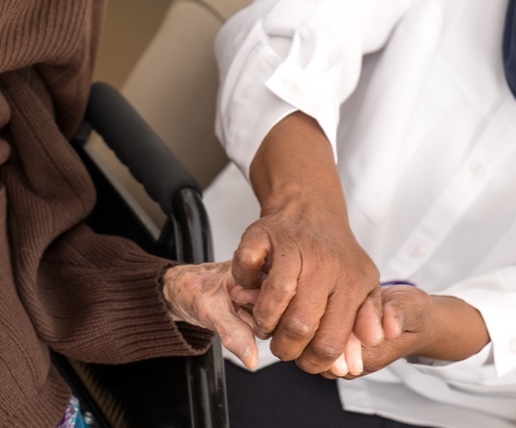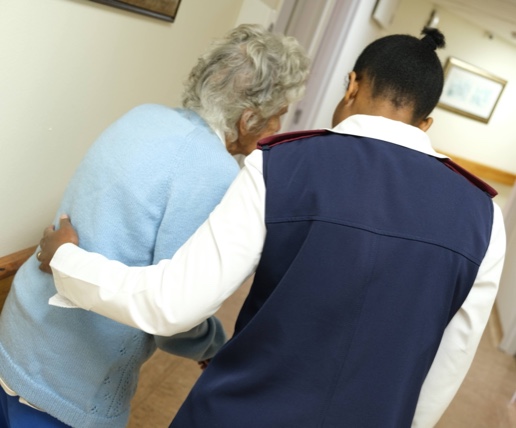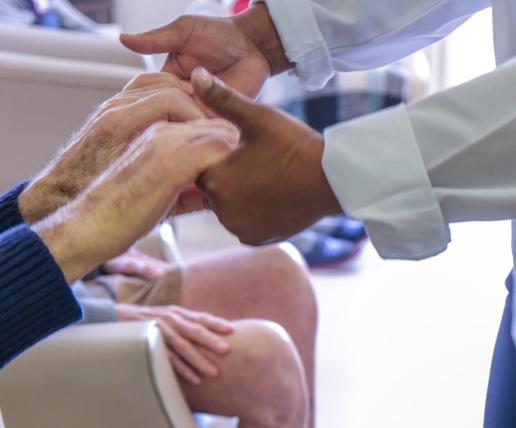
Being diagnosed with a terminal illness brings with it a lot of change and uncertainty. Not only are you and your loved ones experiencing a huge range of emotions, it’s also hard knowing what to do next and how to cope in the long term. While there is no doubt that this is a traumatic time, it is possible to find some peace of mind and make the most of your remaining time together.



1. Emotional stages of terminal illness
When it comes to being diagnosed with a terminal illness, it’s natural to go through a range of emotions. While everyone’s experience is different, every feeling is normal. Some of the most common emotional states include shock, confusion, denial, fear, anger, hope, frustration, sadness, regret, and finally acceptance.
When it comes to being diagnosed with a terminal illness, it’s natural to go through a range of emotions. While everyone’s experience is different, every feeling is normal. Some of the most common emotional states include shock, confusion, denial, fear, anger, hope, frustration, sadness, regret, and finally acceptance.
2. What to do after a loved one is diagnosed with a terminal illness
After a loved one is diagnosed with a terminal illness, it can be really hard to know what to do next. Feeling lost and confused can make you feel stuck and unsure. There are a number of ways you can take control. The first is to get a second opinion. By getting some insight from another medical professional, you can know for sure that the initial diagnosis is correct. Next, ask for honesty from your medical team. While the truth may be hard to hear, it’s better to know for sure what to expect so you can plan appropriately. This includes discussing the best care and treatment plans such as potential care environments, palliative care or hospice care. Additionally, it’s important for your loved one to draw up a living will with an attorney. This is a legal document that will express what your loved one wants to happen when it comes to end-of-life decisions. Finally, consider other factors such as funeral wishes, life insurance and will beneficiaries.
After a loved one is diagnosed with a terminal illness, it can be really hard to know what to do next. Feeling lost and confused can make you feel stuck and unsure. There are a number of ways you can take control. The first is to get a second opinion. By getting some insight from another medical professional, you can know for sure that the initial diagnosis is correct. Next, ask for honesty from your medical team. While the truth may be hard to hear, it’s better to know for sure what to expect so you can plan appropriately. This includes discussing the best care and treatment plans such as potential care environments, palliative care or hospice care. Additionally, it’s important for your loved one to draw up a living will with an attorney. This is a legal document that will express what your loved one wants to happen when it comes to end-of-life decisions. Finally, consider other factors such as funeral wishes, life insurance and will beneficiaries.
3. How to cope with terminal illness
While being diagnosed with a terminal illness can be devastating, there are some healthy ways to help cope with the news. Once your loved one feels comfortable enough to share the news with loved ones, it can be very comforting to experience the love and support of others. Depending on their physical health, your loved one should try to stay as active and socially engaged as possible. Spend time with loved ones and friends, engage in favourite activities and maintain hobbies that bring them joy where possible. Feeling sad and hopeful at times is completely normal, so reassure them that they don’t always have to put on a brave face. Sharing stories of treasured memories with loved ones, watching their favourite movies, joining support groups, resolving personal conflicts, and spending quality time doing the things they love are all ways to bring a sense of peace and joy.
While being diagnosed with a terminal illness can be devastating, there are some healthy ways to help cope with the news. Once your loved one feels comfortable enough to share the news with loved ones, it can be very comforting to experience the love and support of others. Depending on their physical health, your loved one should try to stay as active and socially engaged as possible. Spend time with loved ones and friends, engage in favourite activities and maintain hobbies that bring them joy where possible. Feeling sad and hopeful at times is completely normal, so reassure them that they don’t always have to put on a brave face. Sharing stories of treasured memories with loved ones, watching their favourite movies, joining support groups, resolving personal conflicts, and spending quality time doing the things they love are all ways to bring a sense of peace and joy.
4. What to do if friend or loved one is terminally ill
Coping with the terminal illness diagnosis of a loved one can be extremely sad and stressful. The first step is to reach out to your loved one in a caring and comforting way. Listen to them with compassion but don’t try to offer solutions or platitudes. Learn about you loved one’s illness, and the symptoms and kinds of care they will be needing so that you can support them through it. Try to get enough sleep, exercise and healthy food to ensure you are able to provide the solid support you loved one needs. If there are any outstanding difficulties or concerns in the family, this is the time to deal with them in a calm and respectful manner. Sometimes a third party, such as a family therapist, can help resolve any outstanding issues that may come to the surface in this time of grief.
Coping with the terminal illness diagnosis of a loved one can be extremely sad and stressful. The first step is to reach out to your loved one in a caring and comforting way. Listen to them with compassion but don’t try to offer solutions or platitudes. Learn about you loved one’s illness, and the symptoms and kinds of care they will be needing so that you can support them through it. Try to get enough sleep, exercise and healthy food to ensure you are able to provide the solid support you loved one needs. If there are any outstanding difficulties or concerns in the family, this is the time to deal with them in a calm and respectful manner. Sometimes a third party, such as a family therapist, can help resolve any outstanding issues that may come to the surface in this time of grief.
5. How to make difficult decisions about end-of-life care
When it comes to end-of-life care, it’s essential to take your loved one’s wishes into account. To what extent are they willing to go when it comes to medical intervention in order to prolong their life? Perhaps quality of life may be considered more important than quantity. Have an open and honest conversation with your loved one and their medical team about all of the potential end-of-life interventions and the benefits and drawbacks of each one. And make sure you understand what each type of advance directive covers so that you can prepare accordingly.
When it comes to end-of-life care, it’s essential to take your loved one’s wishes into account. To what extent are they willing to go when it comes to medical intervention in order to prolong their life? Perhaps quality of life may be considered more important than quantity. Have an open and honest conversation with your loved one and their medical team about all of the potential end-of-life interventions and the benefits and drawbacks of each one. And make sure you understand what each type of advance directive covers so that you can prepare accordingly.
At Totalcare, we offer palliative care programmes to support the needs of your loved one throughout every stage of their illness. Our 24-hour care includes access to doctors, nurses, occupational therapists, psychologists, and various other support services, along with world-class assisted living and frail care units..
For more information, click here.
